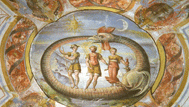4 January till 14 February 2012
GOLDEN AGE
Residency Francesca Grilli

This year, all of a sudden complete flocks of birds fell from the sky all around the world. Soon, this phenomenon was connected with the approaching end of the world in 2012: the birds had supposedly lost their sense of direction now that the magnetic poles of the earth are shifting. The Italian artist Francesca Grilli became fascinated by this premonition of an approaching cosmic catastrophe and decided to make it the theme of her project The Golden Age.
With this Grilli goes back to Oro (2011), a project in which she started an exploration of the myth of King Midas and the meaning of gold. Grilli’s field of research has gradually shifted to the invisible and the magical, and finally ended up in SYB with the alchemists. According to their traditions, we are now living in the last, iron era. Death and decomposition await us at the end of this era. However, the alchemists believe that this does not have to be the final conclusion. For them, a catastrophe is a moment of transformation: the end of an era offers the possibility to return to a golden age. The search of the alchemists to find a way to transform base metals into gold should be seen as a quest; a metaphor for a road to spiritual transformation.
During her stay in SYB, Grilli wants to extend the quest of the alchemist to our time. In a series of small rituals around food and drink of gold, she wants to look, together with the people of Beetsterzwaag, for the current meaning of this precious metal and our contemporary ideas of catastrophe and transformation.
Grilli invited three special guests to aid her in her investigation: Alessandra Saviotti, an independent curator who is interested in the relationship between food and contemporary art, Odette Buntenbach, an aura reader, and Maria Grazia Calo’, a professional chef from Venice who specialises in menus that are in accordance with historical traditions.
Francesca Grilli, 1978 (IT), lives and works in Italy and Amsterdam. She did the XI Advanced Course in Visual Arts, Fondazione Antonio Ratti, Como (IT) in 2005 and studied in 2007 and 2008 at the Rijksakademie van Beeldende Kunsten (Academy of Visual Arts) in Amsterdam. Francesca Grilli finds her inspiration in accidental gestures and details in informal encounters and memories from the past that strike her. Incorporated in her performances and video works, Grilli manages to give those small gestures and details a troubling feel, with which she disturbs the experience of a place and wants to bring about a new perception of time and space. Human communication and form are the driving force of her work, according to the artist.
Grilli’s work could be viewed in two recent solo exhibitions in the Riccardo Crespi Gallery in Milan (2011) and the Mambo, Museum of Contemporary Art in Bologna (2010). Her performances have been staged in Frascati, Amsterdam (2010), Recontres Choregraphiques, Paris (2010) and the Tanzfabriek, Berlin (2009), amongst others. Grilli won the Terna Prize, Rome (2010), the Nuove Arti Prize, MAMBO Bologna (2009) and the International Prize for Performance in Centrale Fies/Galleria Civica di Trento (2006).
Work period:
4 January – 14 February 2012
Opening hours:
Every Saturday and Sunday from 1 pm to 5 pm.
Lecture Alessandro Saviotti ‘Artist’s Restaurant’ and screening of the film:
Sunday 29 January, 2pm
Festive ending and ‘artist talk’:
Sunday 5 February, 2 pm.
Program 29 january:
Lecture Artist’s Restaurant
– History of food. An introduction.
– Food and Art.
– Artist’s Restaurants. Filippo Tommaso Marinetti, Daniel Spoerri, Gordon Matta Clark, Rirkrit Tiravanija, Carsten Höller.
Film – Food and Traditions
– Stanley Tucci, Big Night, 1996, 107′
A failing Italian restaurant run by two brothers gambles on one special night to try to save the business.
Screening – Food and Society
– SuperFlex, Floaded Macdonalds, 2010, 21′
Flooded McDonald’s is a 21 minutes film work in which a convincing life-size replica of the interior of a McDonald’s burger bar, without any customers or staff present, gradually floods with water. Furniture is lifted up by the water, trays of food and drinks start to float around, electrics short circuit and eventually the space becomes completely submerged.
– Martha Rosler, Semiotics of the Kitchen, 1975, 6’09”
Semiotics of the Kitchen adopts the form of a parodic cooking demonstration in which, Rosler states, “An anti-Julia Child replaces the domesticated ‘meaning’ of tools with a lexicon of rage and frustration.” In this performance-based work, a static camera is focused on a woman in a kitchen. On a counter before her are a variety of utensils, each of which she picks up, names and proceeds to demonstrate, but with gestures that depart from the normal uses of the tool. In an ironic grammatology of sound and gesture, the woman and her implements enter and transgress the familiar system of everyday kitchen meanings – the securely understood signs of domestic industry and food production erupt into anger and violence. In this alphabet of kitchen implements, states Rosler, “when the woman speaks, she names her own oppression.”
– Martha Rosler, A Budding Gourmet, 1974, 17’45”
In A Budding Gourmet, Rosler explores the ideological processes through food preparation comes to be seen as “cuisine,” a product of national culture. Accompanied by the strains of a violin concerto, Rosler’s deadpan narrator explains her reasons for wanting to become a gourmet. Photographs from food and travel magazines alternate as Rosler’s narrator discusses food as a key to refinement, breeding, and, in the case of “Eastern” cuisines, spirituality. For her, cooking is a way of accumulating and demonstrating cultural capital, whether it is the haughty elegance of a France she’s never visited, or the fiery exoticism of a Brazil from which she’s just returned and is now “hers” to share with her friends. Rosler illuminates how the concept of the gourmet is bound up with notions of class, as well how the kitchen, traditionally seen as the woman’s sphere of power, is used to cultivate mastery over other cultures, just as surely as is the “male” sphere of politics.
– Peter Greenaway, The Cook, the Thief, His Wife & Her Lover, 1989, 124′
The wife of an oafish restaurant owner becomes bored with her husband and considers an affair with a regular patron.
